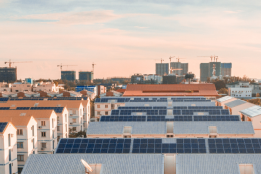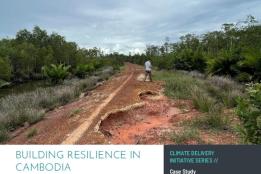A new climate finance target will be a key area of negotiation as COP29 kicks off in Baku, Azerbaijan. More than 100 heads of state, as well as thousands of country negotiators, civil society groups, activists, and others, are expected to converge on the Azerbaijani capital city from November 11 to 22, 2024 focused on the deliberations over some of the most pressing climate challenges and agreeing on bold actions to address the climate crisis.
A ‘Stand and Deliver’ COP
UNFCCC Executive Secretary, Simon Stiell, has called this the “Stand-and-Deliver” COP, plainly stating that the $100 billion annual target by 2025, as set out in the Paris Agreement, is “nowhere near enough” to address the urgency the climate crisis demands. The negotiations around this new global target, known in COP parlance as the “New Collective Quantified Goal (NCQG)”, are underway. In a letter outlining its focus for this year’s meeting, the COP29 Presidency calls these negotiations the “centerpiece”, stating that “the multilateral system is under pressure to show it can deliver at the speed and scale needed."
The negotiation text around the new goal also highlights the need for drawing in private capital to achieve what will no doubt be an ambitious target. We are actively pursuing this aspect as we prepare to launch the CIF Capital Markets Mechanism (CCMM), a first-of-its-kind mechanism with the potential to transform the climate finance landscape by unlocking the potential of private capital markets.
A unifying factor: African negotiators and adaptation funding
The African Group of Negotiators (AGN) are amplifying their calls for adaptation funding. They are presenting a unified position on key negotiation areas including the new climate finance goal, calling for it to be linked to the Global Goal on Adaptation “to bridge the climate finance gap, support vulnerable communities and enhance global co-operation”. The group emphasized in its Pre-COP29 forum, highlighting “the need for increased, predictable, and accessible financing to support climate adaptation and mitigation efforts, particularly in vulnerable regions including Africa, according to the African Group of Negotiators Experts Support which informs the AGN. With our 16-year track record in delivering concessional finance to support countries building climate resilience through our Pilot Program for Climate Resilience (PPCR) and, to build on that, we are now developing a new resilience program to continue our support of adaptation efforts in developing countries.
Converting pledges to progress
Last year’s breakthrough UAE Consensus delivered an important new climate finance mechanism through the Fund Responding to Loss and Damage. Ibrahima Cheikh Diong was recently appointed as the fund’s Executive Director. In a September statement, the COP29 Presidency said it would use the Baku meeting “to work with the countries who have already pledged hundreds of millions to the fund [and] to convert those pledges into tangible funding ready for disbursement to the communities who particularly need it.” The COP29 Presidency will also call for further contributions, the statement said.
CIF in Central Asia
Our work in Central Asia is based on solid partnerships with multilateral development banks such as the European Bank for Reconstruction and Development (EBRD) and the World Bank. We have already supported some of the region’s early green successes, including building the first large-scale power plant in Kazakhstan, pioneering climate-friendly business initiatives in Armenia, and working with Turkish banks to fund clean energy technologies.
During our time in Baku, we will continue to amplify our work on CCMM, engage country partners, industry leaders, and multilateral development banks to decarbonize heavy-emitting sectors, and build momentum to mobilize more funding to build resilience in some of the world's most climate-vulnerable places.
Follow us on Linked In, Facebook, X, and Instagram, and if you’re in Baku, do join us at the Climate Funds Pavilion (Pavilion Area D10) cohosted by the four largest multilateral funds, including the Adaptation Fund, CIF, Global Environment Facility and Green Climate Fund!




